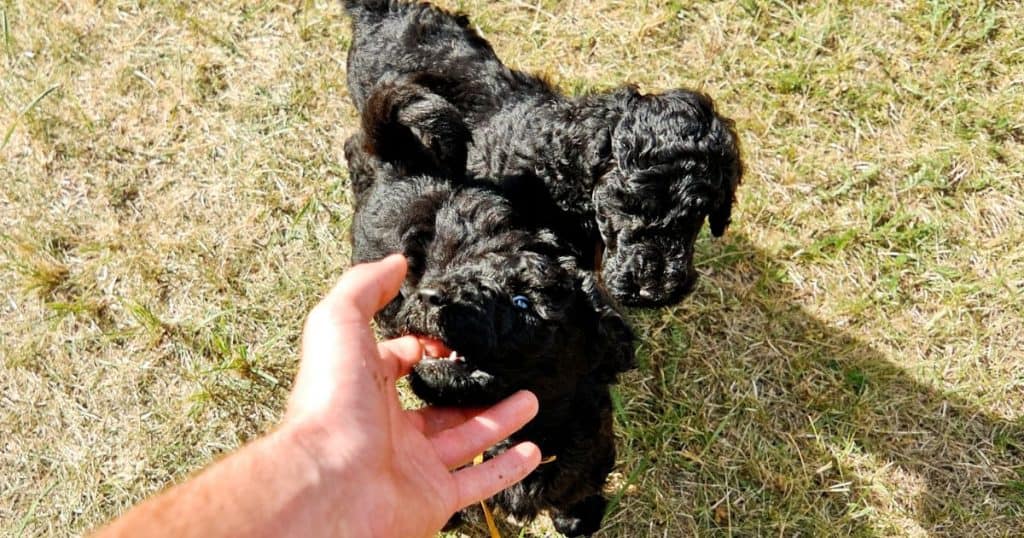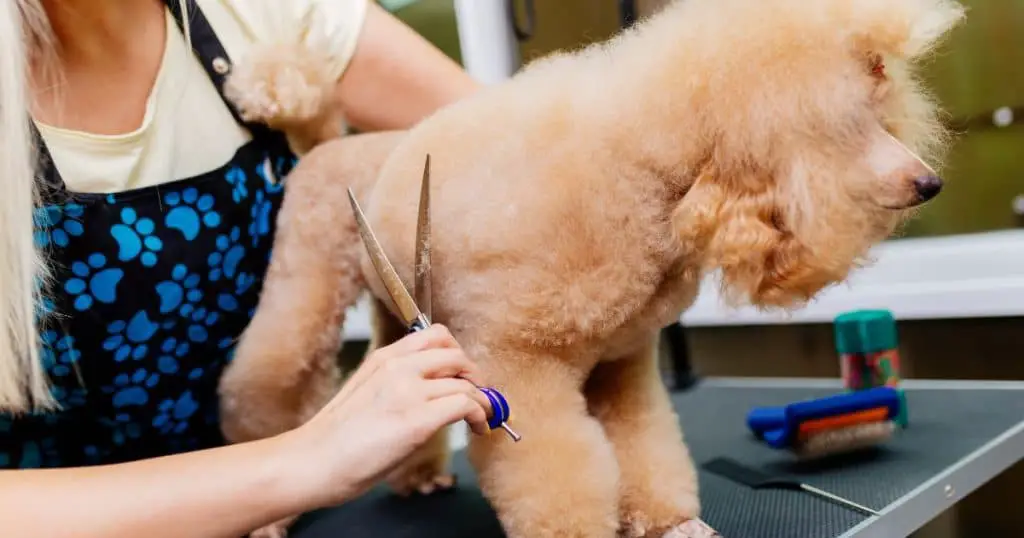What to Know
If you’re a poodle owner, you’re probably aware of their friendly and loving nature. However, like any other breed, poodles can develop behavior problems that can be challenging to deal with. Poodle behavior problems can range from minor issues like nipping and barking to more severe problems like aggression and separation anxiety.
Understanding Poodle behavior is crucial in identifying and addressing their behavior problems. Poodles are intelligent and sensitive dogs that require proper training and socialization. Additionally, genetic and health factors can influence their behavior, making it essential to provide proper care and maintenance. In this article, we will discuss common Poodle behavior problems, their causes, and how to prevent and treat them.
Poodle Behavior Problems

- Poodle behavior problems can range from minor issues like nipping and barking to more severe problems like aggression and separation anxiety.
- Understanding Poodle behavior is crucial in identifying and addressing their behavior problems.
- Proper training, socialization, and care can help prevent and treat Poodle behavior problems.
Understanding Poodle Behavior

Poodles are a popular breed of dog that are known for their unique appearance and friendly personality. They are intelligent, alert, and have strong instincts, which can make them great companions for families and individuals alike. However, like any other breed, poodles can also exhibit certain behavior problems that can be challenging to deal with.
One of the most important things to understand about poodle behavior is their temperament. Poodles are generally calm, friendly, and peace-loving dogs. They are also very intelligent and can be trained to do a variety of tasks, including agility, obedience, and even therapy work. However, they can also be quite timid and sensitive, which can make them prone to anxiety and fear-based behaviors.
Another important aspect of poodle behavior is their personality. Poodles are known for being very loyal and affectionate towards their owners. They are also very social and enjoy spending time with people and other dogs. However, they can also be quite independent and stubborn, which can make training them a challenge at times.
When it comes to specific behavior problems, poodles can exhibit a range of issues, including excessive barking, separation anxiety, aggression, and destructive behavior. These problems can be caused by a variety of factors, including lack of exercise, boredom, and even genetics.
To address these behavior problems, it is important to identify the root cause of the issue. This may involve working with a professional dog trainer or behaviorist to develop a training plan that is tailored to your poodle’s specific needs. Additionally, providing plenty of exercise, mental stimulation, and socialization can also help to prevent many behavior problems from developing in the first place.
In summary, understanding poodle behavior is key to providing a happy and healthy life for your furry friend. By being aware of their temperament, personality, and common behavior problems, you can take steps to ensure that your poodle is well-adjusted and well-behaved.
Common Poodle Behavior Problems

If you’re a Poodle owner, you may have experienced some behavior problems with your furry friend. Poodles are known for their intelligence, loyalty, and friendly nature, but they can also develop some unwanted behaviors. Here are some of the most common Poodle behavior problems and how to solve them.
Aggressive Behavior
Aggressive behavior in Poodles can be a serious issue, and it’s important to address it as soon as possible. Aggression can be displayed in the form of growling, biting, lunging, and other worrisome behaviors. Some common reasons for aggressive behavior in Poodles include fear, territoriality, and dominance. It’s essential to identify the root cause of the aggression to address it effectively. You can try to prevent aggressive behavior by socializing your Poodle from a young age, providing plenty of exercise, and using positive reinforcement training techniques.
Excessive Barking
Poodles are known to be vocal dogs, but excessive barking can become a problem for both you and your neighbors. Some common reasons for excessive barking in Poodles include loneliness, boredom, and anxiety. You can try to prevent excessive barking by providing plenty of exercise, mental stimulation, and socialization. You can also use positive reinforcement training techniques to teach your Poodle to stop barking on command.
Separation Anxiety
Poodles are affectionate dogs that love to be around their owners. However, this can lead to separation anxiety when you leave them alone. Separation anxiety can cause destructive behavior, excessive barking, and other unwanted behaviors. You can prevent separation anxiety by gradually acclimating your Poodle to being alone, providing plenty of exercise and mental stimulation, and using positive reinforcement training techniques.
Fear and Stress
Poodles are sensitive dogs that can easily become stressed or fearful in certain situations. Some common triggers for fear and stress in Poodles include loud noises, new environments, and unfamiliar people or animals. You can prevent fear and stress by socializing your Poodle from a young age, providing plenty of exercise and mental stimulation, and using positive reinforcement training techniques. You can also use tools like calming supplements, pheromone sprays, and anxiety jackets to help reduce stress and anxiety.
Biting and Chewing
Poodles are known to be chewers, and they can develop a habit of biting and chewing on things they shouldn’t. This can be dangerous for your Poodle and can cause damage to your home. You can prevent biting and chewing by providing plenty of chew toys and bones, supervising your Poodle when they are playing, and using positive reinforcement training techniques.
In conclusion, Poodle behavior problems can be frustrating, but with the right training and techniques, they can be solved. By identifying the root cause of the behavior problem and using positive reinforcement training techniques, you can help your Poodle become a well-behaved and happy companion.
Genetic and Health Influences on Behavior

Poodles are known for their intelligence, trainability, and friendly nature. However, like all dogs, they can develop behavior problems that can be challenging for their owners to manage. While some of these problems can be attributed to environmental factors such as lack of socialization or traumatic experiences, others may be due to genetic or health issues.
Arthritis and Pain
Arthritis is a common health issue in older dogs, and poodles are no exception. This condition can cause chronic pain and discomfort, which can lead to changes in behavior such as aggression, irritability, and reluctance to engage in physical activity. If you suspect that your poodle may be suffering from arthritis, it’s important to consult with your veterinarian to develop a treatment plan that can help manage pain and improve your dog’s quality of life.
Sebaceous Adenitis
Sebaceous adenitis is a skin condition that can affect poodles and other breeds. This condition can cause hair loss, skin lesions, and discomfort, which can lead to changes in behavior such as irritability and aggression. While the exact cause of sebaceous adenitis is unknown, it is believed to have a genetic component. If you suspect that your poodle may be suffering from sebaceous adenitis, it’s important to consult with your veterinarian to develop a treatment plan that can help manage symptoms and improve your dog’s quality of life.
Hip Dysplasia
Hip dysplasia is a genetic condition that affects the hip joints of dogs. This condition can cause chronic pain and discomfort, which can lead to changes in behavior such as aggression, irritability, and reluctance to engage in physical activity. If you suspect that your poodle may be suffering from hip dysplasia, it’s important to consult with your veterinarian to develop a treatment plan that can help manage pain and improve your dog’s quality of life.
Progressive Retinal Atrophy
Progressive retinal atrophy is a genetic condition that can affect poodles and other breeds. This condition can cause progressive vision loss, which can lead to changes in behavior such as fearfulness, anxiety, and reluctance to engage in new activities. If you suspect that your poodle may be suffering from progressive retinal atrophy, it’s important to consult with your veterinarian to develop a treatment plan that can help manage symptoms and improve your dog’s quality of life.
Epilepsy
Epilepsy is a neurological condition that can affect poodles and other breeds. This condition can cause seizures, which can lead to changes in behavior such as fearfulness, anxiety, and aggression. While the exact cause of epilepsy is unknown, it is believed to have a genetic component. If you suspect that your poodle may be suffering from epilepsy, it’s important to consult with your veterinarian to develop a treatment plan that can help manage symptoms and improve your dog’s quality of life.
In conclusion, genetic and health issues can play a significant role in the behavior of poodles. By understanding these issues and working closely with your veterinarian, you can help manage symptoms and improve your dog’s quality of life.
Training and Socialization for Poodles

Poodles are intelligent and trainable dogs, but they can exhibit behavior problems if not properly trained and socialized. Obedience training and socialization are essential for a well-behaved Poodle. In this section, we will discuss the importance of obedience training and socialization for Poodles, as well as ways to address aggression and fear.
Obedience Training
Obedience training is crucial for Poodles to learn basic commands, such as sit, stay, and come. Poodles are highly intelligent and eager to please, making them easy to train. Positive reinforcement, such as treats and praise, is an effective training method for Poodles. Consistency is key in obedience training, and training sessions should be short and frequent.
Socialization with Humans and Animals
Early socialization is important for Poodles to learn how to interact with humans and other animals. Socialization should begin as early as possible, ideally between the ages of 3 and 14 weeks. Poodles should be exposed to a variety of people, including children, men, women, and people of different races and ages. They should also be exposed to different animals, such as cats and other dogs.
Addressing Aggression and Fear
Aggression and fear are common behavior problems in Poodles. Aggression can be directed towards humans or other animals and can be caused by a lack of socialization or fear. Fear can be caused by a lack of socialization or traumatic experiences.
To address aggression and fear, it is important to identify the cause of the behavior. If the behavior is caused by fear or lack of socialization, gradual exposure to the feared object or situation can help desensitize the Poodle. Positive reinforcement can also be used to reward calm behavior. If the behavior is caused by a medical condition, such as pain or illness, a visit to the veterinarian is necessary.
In conclusion, obedience training and socialization are essential for a well-behaved Poodle. Early socialization and positive reinforcement are effective ways to prevent behavior problems in Poodles. Addressing aggression and fear requires identifying the cause of the behavior and using appropriate training methods. With proper training and socialization, Poodles can be well-behaved and happy companions.
Poodle Care and Maintenance

As a Poodle owner, it is important to know how to properly care for your furry friend. This section will cover the basics of Poodle care, including diet and exercise, grooming and coat care, and regular vet check-ups.
Diet and Exercise
A healthy diet and regular exercise are essential for a happy and healthy Poodle. It is important to feed your Poodle a high-quality dog food that is rich in protein and nutrients. Consult with your veterinarian to determine the best diet for your Poodle’s age, weight, and activity level.
Poodles are an active breed and require regular exercise to maintain their physical and mental health. Daily walks and playtime are great ways to keep your Poodle active and engaged.
Grooming and Coat Care
Poodles have unique coat that requires regular grooming to keep it healthy and free of mats and tangles. It is recommended to brush your Poodle’s coat daily to prevent matting and tangling. Regular grooming appointments with a professional groomer are also essential for maintaining your Poodle’s coat.
In addition to brushing, it is important to keep your Poodle’s ears and teeth clean to prevent infections and dental problems. Use a gentle ear cleaner and brush your Poodle’s teeth regularly to keep them healthy.
Regular Vet Check-ups
Regular vet check-ups are important for maintaining your Poodle’s overall health and well-being. Your veterinarian can provide routine vaccinations, perform regular health screenings, and provide advice on any health concerns you may have.
In addition to regular check-ups, it is important to seek veterinary care if you notice any changes in your Poodle’s behavior or health. Early detection and treatment of health issues can prevent more serious problems down the road.
In conclusion, proper care and maintenance are essential for a happy and healthy Poodle. By following these basic guidelines for diet and exercise, grooming and coat care, and regular vet check-ups, you can ensure that your furry friend stays healthy and happy for years to come.
Poodles and Their Environment

When it comes to Poodle behavior problems, their environment plays a significant role. Poodles are social animals, and they thrive in a family setting. However, there are certain things to keep in mind when it comes to their behavior around other family members, pets, and strangers.
Poodles in a Family Setting
Poodles are friendly and affectionate dogs that love being around their family members. However, they can become anxious and stressed if they are left alone for long periods. It is essential to spend quality time with your Poodle, play with them, and take them for walks. This will help them bond with you and feel more secure.
Additionally, Poodles can become protective of their family members, especially children. It is crucial to teach your children how to interact with your Poodle properly. Teach them to approach your Poodle gently and avoid sudden movements or loud noises that can startle them.
Poodles and Other Pets
Poodles generally get along well with other pets, especially if they are socialized from a young age. However, they can become territorial and dominant if they feel threatened. It is essential to supervise your Poodle when they are around other pets and intervene if necessary.
Introducing your Poodle to other pets gradually can also help avoid any aggressive behavior. Start with short supervised interactions and gradually increase the time they spend together.
Poodles and Strangers
Poodles are generally friendly with strangers, but they can become anxious or fearful if they are not socialized properly. It is essential to expose your Poodle to different people and environments from a young age. This will help them feel more comfortable around strangers and reduce their anxiety.
However, it is also important to teach your Poodle to differentiate between friendly and threatening strangers. Poodles can become protective of their family members and may bark or growl at strangers whom they perceive as a threat.
In conclusion, Poodle behavior problems can be avoided by providing them with a suitable environment. Spend quality time with your Poodle, socialize them from a young age, and teach them how to interact with family members, other pets, and strangers. This will help them feel more secure and reduce their anxiety and aggression towards others.
Choosing the Right Poodle for You

If you’re considering getting a Poodle, it’s important to choose the right size for your lifestyle. There are three sizes of Poodles: Standard, Miniature, and Toy. Each size has its own unique characteristics, so it’s important to do your research before making a decision.
Standard Poodle
The Standard Poodle is the largest of the three sizes, weighing between 45 and 70 pounds and standing over 15 inches tall. They are known for their intelligence, trainability, and athleticism. Standard Poodles are great for families with children and active individuals who enjoy outdoor activities like hiking and running. They also make excellent service dogs and are often used as therapy dogs.
Miniature Poodle
The Miniature Poodle is smaller than the Standard Poodle, weighing between 12 and 20 pounds and standing between 10 and 15 inches tall. They are known for their intelligence, trainability, and affectionate nature. Miniature Poodles are great for families with children and individuals who live in apartments or smaller homes. They also make great companion dogs and are often used in obedience and agility competitions.
Toy Poodle
The Toy Poodle is the smallest of the three sizes, weighing between 4 and 6 pounds and standing under 10 inches tall. They are known for their intelligence, trainability, and affectionate nature. Toy Poodles are great for individuals who live in apartments or smaller homes and are looking for a lap dog. They also make great companion dogs and are often used in obedience and agility competitions.
When choosing a Poodle, it’s important to consider the size and weight of the dog, as well as their temperament and energy level. Standard Poodles require more exercise than Miniature or Toy Poodles, so it’s important to make sure you have the time and energy to keep up with them. Miniature and Toy Poodles are great for individuals who live in smaller spaces or have less time for exercise.
Overall, Poodles are intelligent, affectionate, and trainable dogs that make great companions for individuals and families alike. By choosing the right size for your lifestyle, you can ensure that you and your Poodle will have a long and happy life together.
Before You Go
In conclusion, Poodle behavior problems can be a real challenge for owners. It is important to be aware of the common health issues and temperament problems that Poodles can experience, such as bloat, hip dysplasia, anxiety, and fearfulness. By understanding and addressing these issues, owners can ensure that their Poodle has a happy, healthy life.
One of the most common behavior problems that Poodles can experience is excessive barking. This can be caused by boredom, fear, or excitement. It is important to find out what is causing your Poodle to bark excessively and address it with consistency and patience.
Another behavior problem that Poodles can experience is destructive chewing. This can be caused by separation anxiety or boredom. Providing your Poodle with plenty of toys and exercise can help alleviate this behavior problem.
It is important to remember that Poodles are generally friendly and sociable dogs. However, even the most well-behaved Poodles can experience temperament issues such as aggression and fearfulness. Understanding and addressing these issues is essential for owners to ensure their Poodle has a happy, healthy life.
In summary, Poodle behavior problems can be a challenge, but with the right care and attention, they can be overcome. By being aware of the common health issues and temperament problems that Poodles can experience, owners can ensure that their Poodle has a happy and fulfilling life.
FAQs
What are some common Poodle behavior problems?
Poodles are generally well-behaved dogs, but they can develop some common behavior problems such as barking excessively, digging, chewing, separation anxiety, and aggression. These behaviors can be frustrating for owners, but they can be corrected with proper training and attention.
How can I correct my Poodle’s stubbornness?
Poodles are intelligent dogs that can sometimes be stubborn. To correct this behavior, you should establish yourself as the pack leader and use positive reinforcement techniques such as treats, praise, and playtime to encourage good behavior. Consistency is key when training a Poodle, so be patient and persistent.
What are some effective ways to discipline a Poodle?
Disciplining a Poodle should be done in a gentle and consistent manner. Physical punishment should never be used, as it can lead to fear and aggression. Instead, use positive reinforcement techniques to encourage good behavior and redirect your Poodle’s attention when they misbehave.
Why do some Poodles suddenly become aggressive?
Poodles can become aggressive due to a variety of reasons such as fear, anxiety, territorial behavior, or lack of socialization. It is important to identify the root cause of the aggression and work with a professional dog trainer to correct the behavior. Never punish or yell at an aggressive Poodle, as this can escalate the behavior.
What are some tips for dealing with dominant Poodle behavior?
Dominant behavior in Poodles can be corrected through consistent training and establishing yourself as the pack leader. Use positive reinforcement techniques to encourage good behavior and avoid physical punishment. Consistency and patience are key when dealing with dominant behavior.
How can I encourage good behavior in my Poodle?
Encouraging good behavior in a Poodle can be done through positive reinforcement techniques such as treats, praise, and playtime. Consistency is key when training a Poodle, so be patient and persistent. Establishing yourself as the pack leader and providing plenty of socialization and exercise can also encourage good behavior in your Poodle.
Remember that every Poodle is unique and may require different training techniques. If you are struggling with your Poodle’s behavior, seek the guidance of a professional dog trainer. With patience and consistency, you can correct your Poodle’s behavior problems and enjoy a happy, well-behaved companion.

